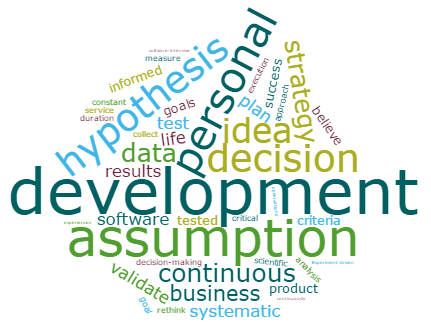Continuous experimentation as a development and decision-making approach has always been one that I found not only to apply to software or businesses development. It could actually also be applied to personal development. Just like in business and product or service development, experimentation, through small, fast, and cheap probes, can allow us to gain deeper insight of what we really want, what makes us happy or what works for us in terms of achieving our goals.
As the cookbook lays out, to conduct successful experiments, a few key elements should be understood (captured in Figure 1). Although these elements are specific to software development in the book, I will use a personal development example to illustrate how this approach might be applicable (see Table 1).

Figure 1: The continuous experimentation cycle that links decision-making to systematic experimentation (Adapted from [1]).
Table 1: Key elements in continuous experimentation applied to a personal development example (Example narrative is in Orange color).


Notably, not all the experimentation elements that are presented in the cookbook or in Table 1 will be necessary for every personal development experiment. In addition, I think that for personal development experiments, there is more flexibility on how scientific they should be. For instance, in experimentation, one must introduce the change and then hold everything else constant to observe cause and effect, but in life it is hard to hold things constant and this might interfere with the results. But I believe a clear hypothesis and good execution plan can mitigate those factors, and can help you make informed decisions where you need them or just want to be certain.
To conclude, continuous experimentation, just as with software or business development, can also work for our personal development, by helping us test our assumptions about what we want or think is true about ourselves, and then help us make informed decisions and changes. Of course this approach is one of many other approaches to decision-making. As highlighted in the cookbook, one of the pitfalls to avoid is making decisions solely from the collected data. As humans, we still have our intuition and experiences to guide the decision making process (see discussion of this in a previous post). But of course decision-making is guided by having access to factual information.
Would definitely love to hear your experiences on how or where you would apply this approach to your personal development.
Source:
[1] Munezero, M., Yaman G. S., Fagerholm F., Kettunen, P., Mäenpää H., et al.: Continuous Experimentation Cookbook: An Introduction to Systematic Experimentation for Software-intensive Businesses, DIMECC Publications Series No.15, Helsinki, Finland, 2017.
Credit:
Post edited by Fabian Fagerholm – https://www.linkedin.com/in/fabianfagerholm
